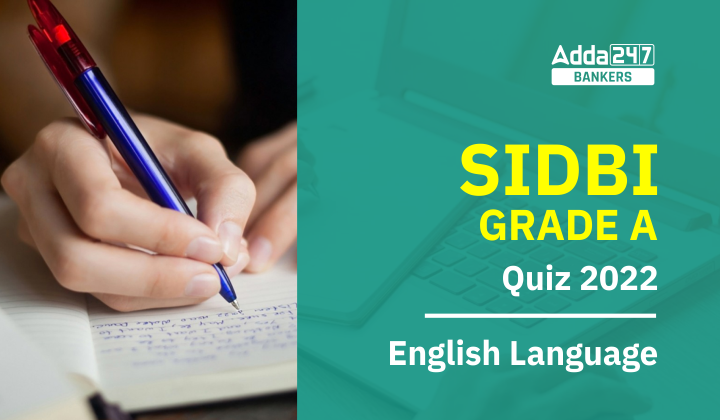Directions (1-10): In the following passage there are blanks, each of which has been numbered. These numbers are printed below the passage and against each, five words are suggested, one of which fits the blank appropriately. Find out the appropriate word in each case.
One day a father of a very wealthy family (1) his son on a trip to the country with the purpose of (2) his son how the poor people live so he could be thankful for his wealth. They spent a (3) of days and nights on the farm of what would be considered a (4) poor family. On their (5) from the trip, the father asked his son, “How was the trip?” “It was great, Dad.” “Did you see how poor people can be?”, the father asked. “Oh yeah”, said the son. So what did you (6) from the trip?”, asked the father. The son answered, “I saw that we have one dog and they had four. We have a pool that (7) in the middle of our garden and they have a creek that has no end.” “We have imported lanterns in our garden and they have the stars at night.” “Our patio reaches to the front yard and they have the (8) horizon.” “we have a small piece of land to live on and they have fields that go beyond our sight.” “We have (9) who serve us, but they serve others.” “We buy our food, but they grow theirs.” “We have walls around our (10) to protect us; they have friends to protect them.” With this the boy’s father was speechless. Then his son added, “Thanks dad for showing me how poor we are”.
Q1.
(a) took
(b) beat
(c) drag
(d) mould
(e) showed
Q2.
(a) presenting
(b) requesting
(c) tell
(d) trusting
(e) showing
Q3.
(a) two
(b) couple
(c) much
(d) few
(e) many
Q4.
(a) major
(b) some
(c) sorrow
(d) very
(e) astutely
Q5.
(a) lane
(b) journey
(c) leave
(d) return
(e) walking
Q6.
(a) reveal
(b) think
(c) saw
(d) believe
(e) learn
Q7.
(a) stands
(b) reaches
(c) swims
(d) leak
(e) watery
Q8.
(a) more
(b) scene
(c) whole
(d) last
(e) lucky
Q9.
(a) servants
(b) mother
(c) computers
(d) relatives
(e) man
Q10.
(a) minds
(b) selves
(c) property
(d) pillars
(e) country
Directions (11-15): Read each sentence to find out whether there is any grammatical or idiomatic error in it. The error, if any, will be in one part of the sentence. The number of that part is the answer. If there is ‘No error’, the answer is €. (Ignore errors of punctuation, if any.)
Q11. It is universally true (a) / that an honest and a hardworking (b) / man is always (c) / a happy man. (d) / No Error. (e)
(a) A
(b) B
(c) C
(d) D
(e) E
Q12. I heard that Mohan (a) / as well as his parents were present (b) / in the wedding ceremony (c) / of his brother. (d) / No Error. (e)
(a) A
(b) B
(c) C
(d) D
(e) E
Q13. They talked over (a) / the matter for (b) / many hours without (c) / arriving to any decision. (d) / No Error. (e)
(a) A
(b) B
(c) C
(d) D
(e) E
Q14. Whenever I see her (a)/ I feel that (b) / she resembles to (c) / her deceased mother. (d) / No Error. (e)
(a) A
(b) B
(c) C
(d) D
(e) E
Q15. I am accustomed with (a) / hard work and (b) / I generally do not (c) / get tired easily. (d) / No Error. (e)
(a) A
(b) B
(c) C
(d) D
(e) E
Solutions
S1. Ans.(a)
S2. Ans.(e)
S3. Ans.(b)
S4. Ans.(d)
S5. Ans.(d)
S6. Ans.(e)
S7. Ans.(b)
S8. Ans.(c)
S9. Ans.(a)
S10. Ans.(c)
S11. Ans. (e)
Sol. The sentence is grammatically correct
S12. Ans. (b)
Sol. ‘was’ will be used in place of ‘were’ as if two subjects get connected with ‘as well as’, ‘in addition to’, ‘like’, ‘unlike’ then the verb is used according to the first subject.
S13. Ans. (d)
Sol. ‘Arriving at’ will be used in place of ‘arrived to’ because ‘arrive at a conclusion/ decision’ is used.
Ex. He did not arrive at any conclusion.
S14. Ans. (c)
Sol. ‘to’ will not be used after ‘resembles’.
S15. Ans. (a)
Sol. ‘accustomed to’ will be used in place of ‘accustomed with’ because after ‘accustomed, habituated, addicted, committed, devoted, confined’, preposition ‘to’ is used.





 English Language Quiz For Bank Foundatio...
English Language Quiz For Bank Foundatio...
 English Language Quiz For Bank Mains Exa...
English Language Quiz For Bank Mains Exa...





